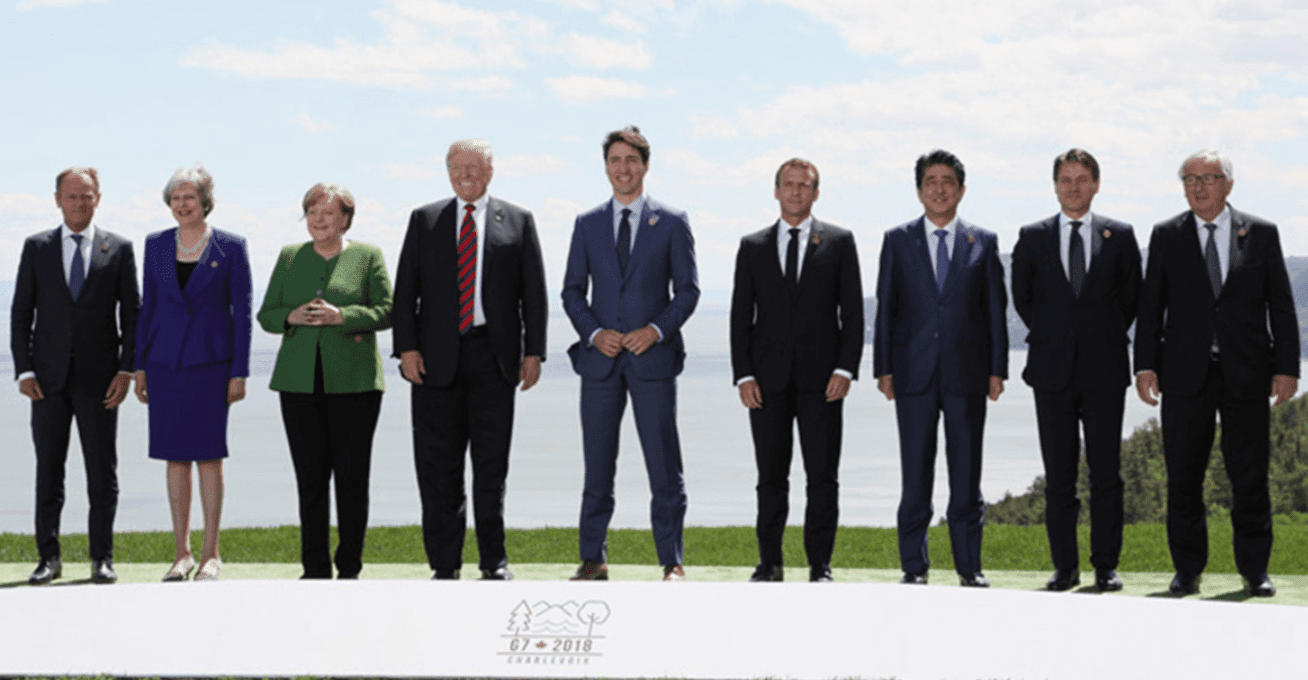So . . . what did we learn from the clusterdumpstertrainshow that was last week's G7 summit in Charlevoix, Quebec? Well, we learned that lichen makes a tasty side dish. We also learned that U.S. President Donald Trump's doctrine can be summed up as follows. And we learned that, for the present, Canada's political discourse has changed in three important ways:
Supply management opponents will face the exact same arguments as before, only with a new magic word.
For years, Canadians who have questioned the wisdom of artificially controlling the national supply of dairy, eggs, and poultry products have had to explain why a) they wish to cripple Canada's apparently uncompetitive farms by allowing more American-made products over our border, and b) they wish to put Canadians' health at risk by allowing growth hormone-filled American milk over our border. (This fear is complete bunkum. I have been drinking American milk for the past six months and have only grown one extra ear.) Accordingly, these same opponents have been forced to bear witness to every party in the House of Commons assuring agricultural lobby groups that this system will remain untouched. Although the commentariat is mostly lined up against supply management, they have yet to successfully reframe the matter around the interests of Canadian consumers, who face unreasonably high food costs and lower food quality and variety while surplus milk goes into sewers.
Now, with Trump attacking this system, there has been a "patriotic boost" to the farm lobby's already seemingly impregnable political influence. Supply management opponents will be, and already have been, accused of siding with Trump and against Canada. With his usual disregard for the consequences, Trump has achieved his greatest desire in life: to have his name stamped on everything.
Tories may hesitate before attacking Prime Minister Justin Trudeau's negotiation tactics.
Just last week, Conservative MP Erin O'Toole, writing in the National Post, expected us to believe that Trudeau made no attempt to identify "areas of mutual interest" and was inordinately focused on the socially progressive elements of his agenda. This week, the House of Commons unanimously passed a motion condemning Trump for his attacks against Trudeau and supporting retaliatory tariffs. The Tories have shifted their own attacks against Trudeau back to ones they had made already: taxes, taxes, taxes, taxes, taxes, and border security. Also, not implementing the Trans-Pacific Partnership (TPP) on schedule, although they had tabled a bill ratifying the text of the agreement in May, and most of its other signatories have been operating on similar schedules.
The G7 debacle was a necessary wake-up call for the rest of Parliament. As long as Trump is president, whomever becomes prime minister after next October's federal election may have to be at the negotiating table with someone who neither understands nor cares about generations of diplomatic tradition, thus rendering the old rules inapplicable. If the Tories are just as unwilling to make the concessions that Trudeau has rejected, they will have to make it clear what they would do differently to ensure that Trump has no cause for overreaction.
Canada will have to forge closer relationships with allies other than the U.S.
Obviously, trade will be a major component of this, hence the pressure to implement TPP. In place already is the Comprehensive Economic and Trade Agreement (CETA) with the member states of European Union (EU). As we speak, Canada also has its eye on South America, negotiating an agreement with the Mercosur trade bloc and looking to upgrade its membership in the Pacific Alliance. Negotiations with India have dragged on for years, but Canada is not without major trading partners in Asia, having concluded talks with South Korea in 2014. And with 44 countries in Africa becoming party to their own free trade agreement in March, Canada has a new corner of the world economy to explore.
So Canada has plenty of export markets at its disposal; if only its private sector were so eager to take advantage of them. But as I wrote in a previous column, Canada has little ability to influence geopolitics except as a partner of a more powerful nation, which has typically been the U.S. As a pillar of global liberal democracy, Canada may have to turn more frequently to Germany and France, the world's two largest, strongest pillars, for leadership in the event of an international crisis.
Written by Jess Morgan






